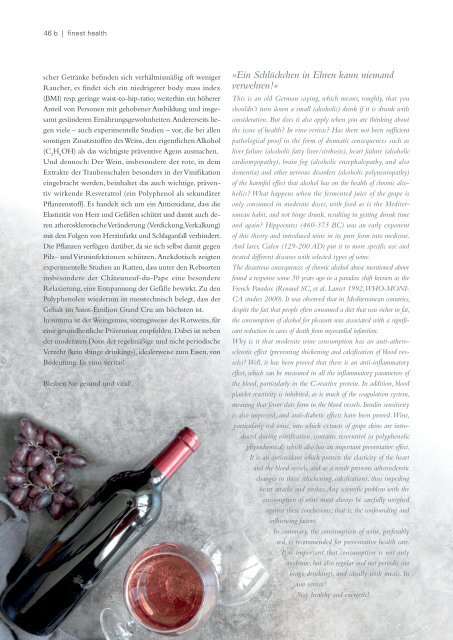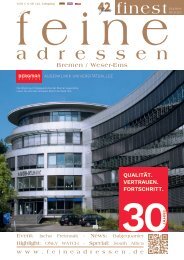»feine adressen – finest« – Berlin 4 21
Interview: Dr. med. Christoph Wendelmuth · Living: Es werde Licht · Travel: Wellness-Auszeit
Interview: Dr. med. Christoph Wendelmuth · Living: Es werde Licht · Travel: Wellness-Auszeit
Sie wollen auch ein ePaper? Erhöhen Sie die Reichweite Ihrer Titel.
YUMPU macht aus Druck-PDFs automatisch weboptimierte ePaper, die Google liebt.
46 b | finest health<br />
scher Getränke befinden sich verhältnismäßig oft weniger<br />
Raucher, es findet sich ein niedrigerer body mass index<br />
(BMI) resp. geringe waist-to-hip-ratio; weiterhin ein höherer<br />
Anteil von Personen mit gehobener Ausbildung und insgesamt<br />
gesünderen Ernährungsgewohnheiten. Andererseits liegen<br />
viele <strong>–</strong> auch experimentelle Studien <strong>–</strong> vor, die bei allen<br />
sonstigen Zusatzstoffen des Weins, den eigentlichen Alkohol<br />
(C 2<br />
H 5<br />
OH) als das wichtigste präventive Agens ausmachen.<br />
Und dennoch: Der Wein, insbesondere der rote, in dem<br />
Extrakte der Traubenschalen besonders in der Vinifikation<br />
eingebracht werden, beinhaltet das auch wichtige, präventiv<br />
wirkende Resveratrol (ein Polyphenol als sekundärer<br />
Pflanzenstoff). Es handelt sich um ein Antioxidanz, dass die<br />
Elastizität von Herz und Gefäßen schützt und damit auch deren<br />
atherosklerotische Veränderung (Verdickung, Verkalkung)<br />
mit den Folgen von Herzinfarkt und Schlaganfall verhindert.<br />
Die Pflanzen verfügen darüber, da sie sich selbst damit gegen<br />
Pilz- und Virusinfektionen schützen. Anekdotisch zeigten<br />
experimentelle Studien an Ratten, dass unter den Rebsorten<br />
insbesondere der Châteuneuf-du-Pape eine besondere<br />
Relaxierung, eine Entspannung der Gefäße bewirkt. Zu den<br />
Polyphenolen wiederum ist messtechnisch belegt, dass der<br />
Gehalt im Saint-Émilion Grand Cru am höchsten ist.<br />
In summa ist der Weingenuss, vorzugsweise des Rotweins, für<br />
eine gesundheitliche Prävention empfohlen. Dabei ist neben<br />
der moderaten Dosis der regelmäßige und nicht periodische<br />
Verzehr (kein »binge drinking«), idealerweise zum Essen, von<br />
Bedeutung. In vino veritas!<br />
Bleiben Sie gesund und vital!<br />
»Ein Schlückchen in Ehren kann niemand<br />
verwehren!«<br />
This is an old German saying, which means, roughly, that you<br />
shouldn’t turn down a small (alcoholic) drink if it is drunk with<br />
consideration. But does it also apply when you are thinking about<br />
the issue of health? In vino veritas? Has there not been sufficient<br />
pathological proof in the form of dramatic consequences such as<br />
liver failure (alcoholic fatty liver/cirrhosis), heart failure (alcoholic<br />
cardiomyopathy), brain fog (alcoholic encephalopathy, and also<br />
dementia) and other nervous disorders (alcoholic polyneuropathy)<br />
of the harmful effect that alcohol has on the health of chronic alcoholics?<br />
What happens when the fermented juice of the grape is<br />
only consumed in moderate doses, with food as is the Mediterranean<br />
habit, and not binge drunk, resulting in getting drunk time<br />
and again? Hippocrates (460-375 BC) was an early exponent<br />
of this theory and introduced wine in its pure form into medicine.<br />
And later, Galen (129-200 AD) put it to more specific use and<br />
treated different diseases with selected types of wine.<br />
The disastrous consequences of chronic alcohol abuse mentioned above<br />
found a response some 30 years ago in a paradox shift known as the<br />
French Paradox (Renaud SC, et al. Lancet 1992; WHO-MONI-<br />
CA studies 2000). It was observed that in Mediterranean countries,<br />
despite the fact that people often consumed a diet that was richer in fat,<br />
the consumption of alcohol for pleasure was associated with a significant<br />
reduction in cases of death from myocardial infarction.<br />
Why is it that moderate wine consumption has an anti-atherosclerotic<br />
effect (preventing thickening and calcification of blood vessels)?<br />
Well, it has been proved that there is an anti-inflammatory<br />
effect, which can be measured in all the inflammatory parameters of<br />
the blood, particularly in the C-reactive protein. In addition, blood<br />
platelet reactivity is inhibited, as is much of the coagulation system,<br />
meaning that fewer clots form in the blood vessels. Insulin sensitivity<br />
is also improved, and anti-diabetic effects have been proved. Wine,<br />
particularly red wine, into which extracts of grape skins are introduced<br />
during vitrification, contains resveratrol (a polyphenolic<br />
phytochemical) which also has an important preventative effect.<br />
It is an antioxidant which protects the elasticity of the heart<br />
and the blood vessels, and as a result prevents atherosclerotic<br />
changes in these (thickening, calcification), thus impeding<br />
heart attacks and strokes. Any scientific problem with the<br />
consumption of wine must always be carefully weighed<br />
against these conclusions; that is, the confounding and<br />
influencing factors.<br />
In summary, the consumption of wine, preferably<br />
red, is recommended for preventative health care.<br />
It is important that consumption is not only<br />
moderate, but also regular and not periodic (no<br />
binge drinking), and ideally with meals. In<br />
vino veritas!<br />
Stay healthy and energetic!


















